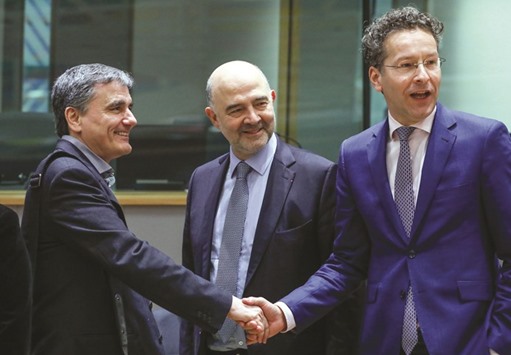Greece has agreed with its lenders on key labour reforms, spending cuts and energy issues, moving closer to clinching a deal before a meeting of eurozone finance ministers on April 7, sources close to the talks said yesterday.
The European Commission could not immediately confirm the report of a preliminary deal.
The report drove Greek government bond yields to multi-week lows.
Negotiations between Athens, the European Union and the International Monetary Fund – which has yet to decide if it will participate in Greece’s current bailout — have dragged on for months, rekindling fears of a new crisis in Europe.
The latest progress is expected to help allow the return of EU and IMF mission chiefs to Athens in the coming days to finalise details with Greek finance and labour ministers before the Eurogroup meeting in Malta.
The main focus of the talks has been pension cuts, energy and labour reforms. Athens agreed last month to adopt more measures, worth 2% of GDP, to help convince the IMF to participate in the bailout, which is sought by EU countries including Germany.
Greece will cut pension spending by up to 1% of GDP in 2019, two officials told Reuters on condition of anonymity.
Lowering the tax-free threshold would raise roughly another 1% of GDP has also been agreed, an EU official said.
“I believe there will be a staff level agreement by the April 7 Eurogroup,” one of the officials said.
On labour reforms, Greece will not be forced to ease present restrictions on collective redundancies initially sought by the IMF, another official said.
Collective bargaining, which was weakened as part of bailout reforms in 2012, is expected to be revived after the country’s current bailout programme expires in 2018. Greece and lenders are still negotiating other labour issues.
Slashing the market share of state-controlled Public Power Corp through the sale of coal-fired units, has also been agreed, another official said.
However, an energy ministry official said the issue was still under discussion.
Any PPC move to sell assets is likely to stir controversy, and labour unions have already warned of industrial action if it goes ahead.
Energy Minister George Stathakis was due tomorrow to tour northern Greece, where PPC is a big employer.
Greece will start legislating for the reforms agreed once the deal is sealed, a government spokesman said, adding that the negotiation was still ongoing.
On Tuesday the government submitted to parliament a bill on an out-of-court settlement of non-performing corporate loans.
Greece hopes that wrapping up the second review of bailout progress will pave the way for crucial talks on post-bailout debt relief. Finance Minister Euclid Tsakalotos has said debt restructuring would help the country return to markets before its bailout expires.
Earlier, a spokesman for the European Stability Mechanism, the eurozone’s bailout fund said that possible additional debt relief for Greece could be decided only at the end of the bailout programme.

Greek Finance Minister Euclid Tsakalotos (left), European Economic and Financial Affairs Commissioner Pierre Moscovici (centre) and Dutch Finance Minister and Eurogroup President Jeroen Dijsselbloem take part in a eurozone finance ministers meeting in Brussels. Greece hopes that wrapping up the second review of bailout progress will pave the way for crucial talks on post-bailout debt relief.
